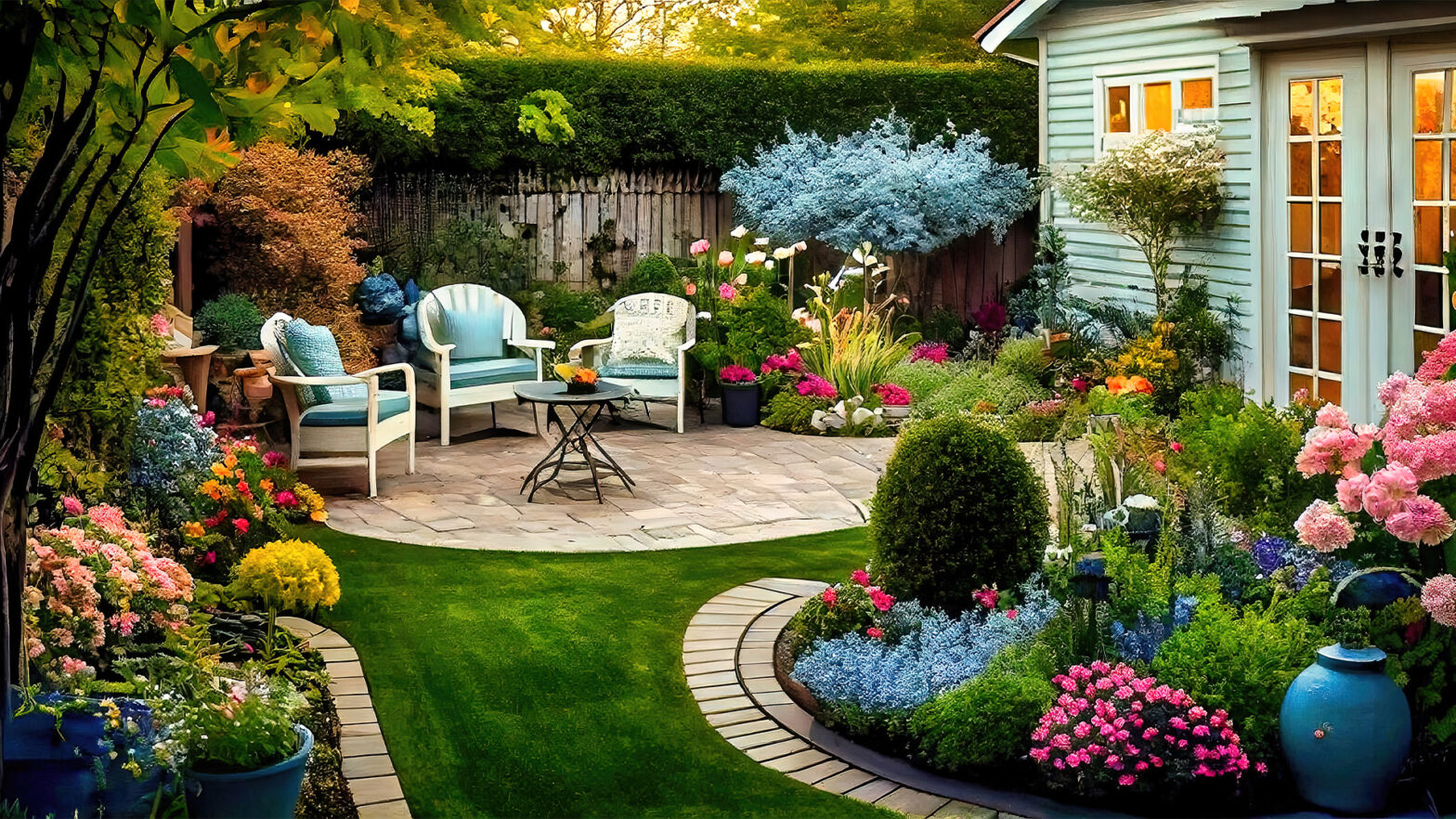
North facing gardens can be just as beautiful and inviting as any other outdoor space. Despite experiencing limited sun, there are some brilliant things you can do to transform your North facing garden, improving its appearance and making most of the limited sun that it gets.
Below, gardening expert Fiona Jenkins at MyJobQuote.co.uk explains Provides some great ideas for a North facing garden. This guide unlocks the secrets to transforming your shady sanctuary, brimming with creative ideas and practical tips. From strategically placed seating areas to shade-loving plant varieties, learn how to embrace the unique charm of a north facing garden and cultivate a flourishing haven you’ll love spending time in.
Ideas For a North-Facing Garden
Change The Layout to Suit The Sun
Most people like to have their seating area close to the house, which is fine in most gardens. However, a north-facing garden will see more sun at the end of the garden. With this in mind, it may be worth thinking about moving your seating to the end of the garden so you can enjoy the sun for longer. You can work with this idea by creating a journey through the garden to the seating area. Think, pathways, borders, and decorative elements to make the approach to the seating area much more exciting.
Use Shade-Loving Plants
A north facing garden may seem darker and gloomier than other gardens. A great way to brighten up the space and create interest is with a range of shade loving plants. Some examples include Japanese forest grass, green ferns, and tree ferns. These are great for making your garden seem much more calm and inviting. Green foliage and white flowers work well in shaded areas as they help to brighten up the space.
Remove The Lawn
If you have a relatively small north-facing garden, you may want to consider ditching the lawn. Grass needs sunlight in order to thrive, so a lawn in a north-facing garden may not look as appealing as you’d imagined. Instead, you could use this space for larger flower beds and a good-sized patio area for entertaining. If you are adamant about having a lawn in your north-facing garden, you must remember that it needs to be situated in the sunniest area of the garden in order to look good.
Think About Structures
Fences, garden walls, tall trees, and sheds can block the sunlight. You may just have to put up with some of them. However, lowering the height of a fence or moving a shed to a new location may help invite more sunlight into the space. Thinning out trees can also help more sunlight enter the garden. You may also want to consider replacing your fence panels with a trellis or horizontal slatted screen.
Make Use of Outdoor Lights
If you like to entertain in your garden, you may want to consider installing some outdoor lights. This will allow you to enjoy your garden for much longer. There are several lights you can choose from. For example, strong lights work very well in the garden, as do small post lights. You may also want to make use of lights to light up pathways or surround the patio area. Not only will this look great and be very practical, but it can also help to make your garden much safer. Do keep in mind, though, that if you are installing solar lights, you’ll want to ensure the solar panel is placed somewhere in the sunniest part of your garden to ensure it can get enough charge to power the lights through the night.
Bring In Light Illusions
In a garden where light is limited, you can create the illusion of more light in several ways. Consider fixing a mirror to a fence or shed for a bright sparkle. The mirror will help to reflect light around the garden. However, be careful not to place mirrors anywhere where birds may fly into them. A pond or some other type of water feature can also help to reflect light around the garden. Plus, these will also help to attract more wildlife to your garden.
What Can You Do With a North-Facing Garden?
There are many things you can do with a north-facing garden. Although the garden won’t get much sunlight, that doesn’t mean you can’t enjoy it. Having a place to sit at the end of the garden will ensure that you can enjoy the sun for as many hours as possible during the day. Choosing shade-loving plants will also mean that you can create a beautiful garden space that looks amazing.
Do You Get Any Sun in a North-Facing Garden?
North facing gardens will typically spend most of the day in the shade since the house tends to block the sunlight. However, if you have a large garden or a long garden, you may get sunlight at the end of the garden. North facing gardens typically get around 3 – 4 hours of direct sunlight each day. It will usually get some sun in the morning as the sun rises in the east and some sun at night when the sun sets in the west.
What Plants Are Best For a North-Facing Garden?
There are several flowers and plants that you can choose from for a north-facing garden. Below is a list of the best plants to choose for a north-facing garden:
Snowdrops
Snowdrops are great for a north facing garden as they are white when in bloom, helping to brighten up your garden space. The flowers don’t tend to last as long in sunny areas, making them perfect for north facing gardens.
Snake’s Head Fritillaries
These are very pretty wildflowers, and they’re easy to grow and maintain. Consider missing your snake’s head fritillaries with snowdrops and wood anemones, as these all enjoy growing in similar conditions.
Lily of The Valley
These flowers give off a beautiful, rich scent. They thrive in shady conditions and will gradually spread to create a carpet of flowers and foliage. Lily of the Valley also makes a great cut flower.
Rhododendrons
If you are gardening on acid soil, rhododendrons are a great choice. These will provide evergreen colour as well as beautiful, colourful blooms in the spring. Some varieties also provide a lovely scent. Not all varieties can be grown in shade, so make sure you check before purchasing.
Ferns
There are many ferns you can grow in a north-facing garden. Large ferns such as the shuttlecock fern and the royal fern are great for filling out areas of the garden with greenery. For the front border, you may want to consider smaller ferns, such as the common polypody.
Final Thoughts
So, as you can see, a north facing garden doesn’t have to be a shadowy, forgotten space. With a little creativity and planning, you can cultivate a thriving and inviting haven that flourishes despite limited sunshine. Embrace the unique charm of your North facing garden, and you’ll be rewarded with a tranquil oasis that provides a cool escape on hot summer days.































